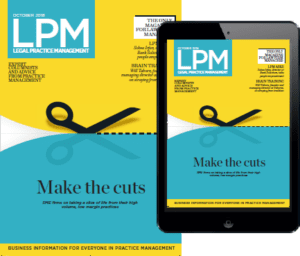
What does it mean to be a legal practice manager?
Kirsty Pappin, winner of LPM Practice Excellence 2020 Practice manager of the year award, discusses the role of the legal practice manager.
 The role of a practice manager (or practice director) in a SME law firm can be ambiguous. Its meaning can vary depending on the requirements of the firm, including its size, structure, affordability and future plans. No two job specs produced for the role will ever be the same and often, there is no job spec at all – just an overarching description of what the firm is looking for, which, let’s be honest, is pretty much everything! For many a firm, personality fit and innovative drive is key when making a hire.
The role of a practice manager (or practice director) in a SME law firm can be ambiguous. Its meaning can vary depending on the requirements of the firm, including its size, structure, affordability and future plans. No two job specs produced for the role will ever be the same and often, there is no job spec at all – just an overarching description of what the firm is looking for, which, let’s be honest, is pretty much everything! For many a firm, personality fit and innovative drive is key when making a hire.
What is clear, is a practice manager is the operational power behind an army of fee earners, and the necessity of one should not be undervalued. They are business orientated individuals who keep a law firm in check, especially with stricter compliance required than ever before with new legislation and the numerous regulatory bodies. In fact, it could be said that a practice manager takes on the persona of a COO in a SME law firm.
According to an article published by job site Totally Legal in May 2017, a practice manager provides “a demandingly diverse skills mix ranging from people management and marketing to finance, facilities and administration. Responsible for the seamless daily running of the practice, this is a roll-up-your-sleeves role that requires commercial awareness and first-class coordination and communication skills.” This sums it up quite nicely.
Indeed, a practice manager needs to be highly skilled in a multitude of areas: finance, compliance, HR, change management, IT and business support, project management, facilities, health and safety, security, business development and marketing, event management and general office administrative duties. And with some smaller firms squeezing their hiring of support staff, the role really does cover everything in this arena – from booking meeting rooms to implementing initiatives to assist firm growth.
Working as a practice manager requires exceptional cognitive abilities and emotional intelligence. One must keep many plates spinning all the while keeping partners, fee earners and support staff happy. This is a fine balancing act and requires finesse to collaborate well with all. The bridge, so to speak, between each working end of a law firm. Both a leader and a follower – a team player and an individual. Other essential attributes would also include maturity, integrity, loyalty, ingenuity, tact and all dusted with a positive disposition.
It would be unrealistic to think the role is nine-to-five – practice management for a firm transcends traditional working hours and a practice manager needs to be able to accommodate this. Ready to exert effort; and partners depend on this willingness as part of the management of their firm.
It’s a continuously evolving role and, to excel, one must be always be learning and pooling new knowledge from the various sectors to drive their personal and firm development forward. And as mentioned, there are quite a few areas that require this attention!
Something to think about when exploring the financial worth of a practice manager: the larger the firm, the larger the number of support roles. Each department has two or more people working within it, and so what would be the practice manager, is in fact the director of ‘X’ who oversees all. But every firm, no matter its size, still has the same compliance to adhere to, just the quantity is less not the quality, yet the SME law firm practice manager invariably does it all.
It can probably be agreed that the practice manager is not a role to be taken lightly. But being in the role can be incredibly rewarding – it allows an individual to pursue various areas of expertise under one umbrella. Practice managers bring a very specific professional skill set to law firms and are integral to functional responsibilities and strategic advancement. As for the future, who knows where career development in the role could lead. With many firms now promoting non-lawyers to partner level, there is every chance more successful practice managers could become partner level and/or C-suite. It’s a very exciting time for ambitious practice managers!
Keep an eye out for more in Kirsty’s series on the ins and outs of the practice manager role.

Competitive edge: Law of attraction

Finding optimism to navigate 2020
Joanna Kingston-Davies, group chief operating officer at MAPD (acquired Jackson Lees Group), says people don’t have to be hard on themselves or their staff to make it through hard times.
Right now, I think we should all be giving ourselves a massive pat on the back for making it through the last six months. If you’re reading this and you had a comprehensive pandemic business continuity plan in place at the end of 2019 and have found the whole thing a breeze, this might not be for you.
If, however, you were already contending with the standard craziness of working out how best to lead and manage people, deal with floods, fires, cyber security, agile working, professional indemnity insurance (PII) renewal, our regulatory framework, cashflow management, partner politics and reward frameworks when the pandemic hit – we hear you!
Seriously, it’s way too easy to get caught up in the endless doom and gloom at the moment but sometimes we all just need to take a step back and congratulate ourselves for doing alright so far. We’ve never, ever, been so deeply grateful for incredible management and ops teams in the law firms we own who have carried on working their magic on a completely dynamic and tireless basis to get it right, and we realise just how lucky we are. But that’s tough if you’re not of a scale to have that level of infrastructure, or if you’re constantly balancing case work and client demands with operational emergencies, let alone the need to renew your PII in a hard market (it’s pretty much been a hard market for the last 20 years – so let’s just call it ‘the market’, (eh?) and accept it for what it is rather than waiting for the day when our underwriters joyfully announce that we are now in a ‘soft’ market!).
Compassion and flexibility
Key wins within our businesses over the last six months have definitely been:
- The MAPD approach to people and the comms plan – how we talk to people, through what channels, tone of voice, relentlessly, passionately and genuinely – because our people are incredible and they will always come first.
- Empowering people at every level of the business to get involved in solving problems and raising the bar so that the right people get involved in the right things, rather than because their job title or a hierarchy suggests that they should do.
- Quick and simple governance and decision-making processes with minimal red tape or politics so that stuff gets done.
- Great relationships with suppliers and other stakeholders who were seriously helpful throughout lockdown.
- The ability to plan dynamically and see strategy as an ever-evolving piece – focusing on the journey rather than the destination – so that new opportunities and different, more effective ways of doing things don’t pass us by.
There are so many incredible opportunities in the legal services market, whether that be through structure, service delivery or approach to our people. We’ll cover all of these off in a bit more detail in the next few blogs but in the meantime, here’s to you for getting to the final strait of 2020 – let’s be kind to ourselves and keep the optimism going.

Competitive edge: Law of attraction
Most Popular

Where are the challenges for SME law firm leadership changing?

The leading annual picture of SME law firms' changing strategic priorities

Law firms undertaking identity verification checks must register as an ASCP

Robust onboarding processes are fundamental to effective risk prevention
TA Triumph-Adler provides tailored support to meet compliance requirements

Osprey Approach's webinar explores the benefits of a digital-first approach



